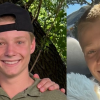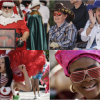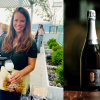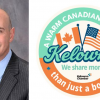The Penticton waterfront at Okanagan Lake briefly turned orange this morning as several hundred people of all heritages and ages, most wearing orange shirts or orange paraphernalia, gathered for the National Day for Truth and Reconciliation "Walk for the Children."

The event kicked off just after 10 am at the Penticton Peach near Rotary Beach, where various speakers, including Penticton Indian Band chief Greg Gabriel and elders and survivors of the residential school system addressed a crowd that just kept building as the minutes wore on.

By approximately 10:30, led by those very same elders and survirors, the group began a march that would ultimately take them past the SS Sicamous and south along the Penticton Channel to Green Mountain Road for an abbreviated water ceremony, and then on to the Syilx Indian Residential School Monument on En’owkin Trail.

Penticton Indian Band elder and survivor Jack Kruger spoke at the start, at the water ceremony and at the monument. And although he hit hard and shocked with memories of his own experience in the horrific system, he also struck a conciliatory tone.

At one point he wondered aloud if the "nuns and the priests had a book on how to rape and murder us," adding that it all seemed so consistent.

But at the water ceremony, just a few feet from the Channel, Kruger was strikingly magnanimous. He spoke of the orange shirt taking on a life of its own, about moving forward.

"We want to make sure that even though we understand this, we can still all move forward," he said. "What happened in the past can never be resolved, most of them are probably dead. They’re probably not around to even worry about anymore.

"Other than that, let's all move forward with all the good things in life and let's all take care of each other."

Later at the monument, Kruger had some noble advice for those in the crowd.

"What we have had to live through is ours, not yours," he said. "So don’t take it home with you. We can't help it. There are things in our memories we can never let go no matter what it is."

And there was no shortage of participants at the start to graciously give their thoughts to PentictonNow.

Jeanette Beaven said she attended "out of respect for our neighbours, and respect for the young people and the older people I've gotten to know over the years."

Michelle Carboni said, "It's hard to express in words why I'm here today. I just feel it’s time for us to be here.

"I've thought about it a lot over the year. I have some Metis genealogy in my family as well. It's just time for us to pay attention and learn the history of our country, of Turtle Island."

Angela Klein showed up with a hand print painted across her mouth.

"I'm here to support Indigenous people like myself," she said. "This is just my way of honouring my ancestors and a lot of my relatives who've passed on. And I'm so happy with the turnout today.

"The hand print represents our way of saying we're not going to sit silent on this any longer. For the residential school survivors as well as the missing and murdered Indigenous women and girls and two-spirited people."

Ida Crocker sported a painted hand print as well, only hers seemed to mimic a slap across the face. Or a caress.

"I'm part of the 'Sixties Scoop,'" she said. "It's just as important as Truth and Reconciliation. It's where kids were taken away and put in various homes or adopted out to white families.

"This thing on my face an orange hand print. In my mind it was violent to take kids from their families. So this can be violent. But it can be a kind hand as well.

"I believe people walking today are trying to heal with us. I hope for a better future for everybody."

Dave Bullock took part to support his mother-in-law, a residential school survivor.

"She's indigenous and lives in Whitehorse," he said. "She's been involved with womens' rights for many years and was lucky to be one of the representatives who went to Rome and actually met the Pope."

For Ruby Peterson and hubby George, who purchased orange shirts for last year's event but were unable to make it, today was about fairness.

"Two of our grandsons have Indigenous heritage and we have friends who are indigenous too," said George. "But it’s not just that. It's just a matter of being fair to everybody. To treat everybody like human beings."

Today there were a lot of human beings walking for each other.

















